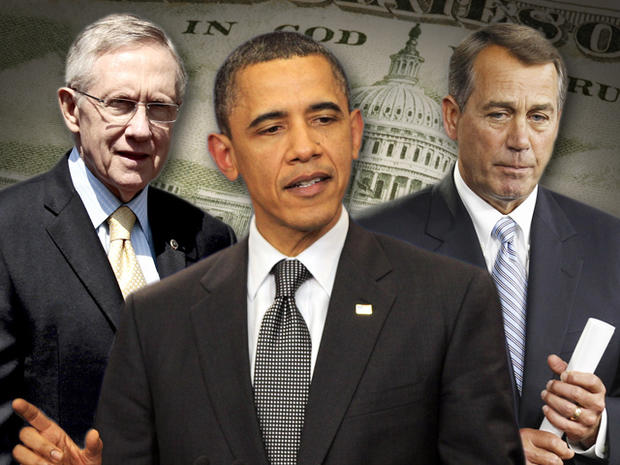Budget deal still leaves largest deficit in history
If you believe the spin from the White House and the offices of congressional leaders, there were only winners in the struggle to reach a budget agreement last night and avert a government shutdown.
Both House Speaker John Boehner and Senate Majority Leader Harry Reid called the agreement "historic" and President Obama praised "their leadership" while a team of his top aides did the same for him. (Watch Obama's speech)
A shutdown was avoided and some officials may have racked up a few points on the public perception scoreboard, but it all stems from a failure by the 111th Congress to enact the appropriations bills it was supposed to for the 2011 fiscal year that began last October 1st - six months ago.
With Democrats in charge of both chambers last year, the leadership didn't see to it that Congress do its budget job. On the contrary, Democrats Nancy Pelosi and Harry Reid decided their party's members would fare better in the Nov. 2nd elections if Congress didn't pass the appropriations bills which called for the largest federal deficit in history of over $1.6 trillion.
Government shutdown avoided in last-minute deal
Was government shutdown fight a prelude to larger battles?
Rep. Steve King: King: Budget fight shows strength of Tea Party
So does anyone in government deserve applause or acclaim for passing a budget bill more than six months into the fiscal year it covers?
Depending on whose numbers you accept, the budget agreement calls for either $87.5 billion in cuts or $38.5 billion. Either way, it's a drop in the budget bucket.
The federal budget for 2011 calls for spending of $3.819 trillion and a deficit of $1.645 trillion. Both numbers are the largest in U.S. history.
The hard-fought budget cuts contained in the agreement will reduce the amount of federal deficit spending, but not by much. Even using the $87.5 billion figure repeatedly trumpeted last night by Sen. Reid, it amounts to a 5.3 percent reduction in the government's runaway spending blueprint.
"There is not much of a difference between a $1.5 trillion deficit and a $1.6 trillion deficit," says Sen. Rand Paul, R-Ky., who voted against the short-term funding bill last night. He said the deficit is still way too big and "will lead us to a debt crisis that we may not recover from."
It's possible the battle over the 2011 budget will quickly fade from memory in a few weeks when Congress must address the issue of raising the federal debt limit.
Treasury Secretary Tim Geithner warned Congress this week that the U.S. government will hit the $14.3 trillion ceiling on borrowing "no later than May 16." He said unless the limit is raised, the Treasury risks default on its obligations by July 8.
"Default by the United States is unthinkable," said Geithner in his letter to Congress Monday. Unthinkable, though some Treasury officials can think of nothing else. They fear it would - as Geithner wrote - "cause a financial crisis potentially more severe than the crisis from which we are only now starting to recover."
And the congressional battle over raising the national debt could make the budget fight just ended seem like a minor skirmish in comparison.
All concede default by the government would be a calamity and damage America's financial and political standing in the world. But some in Congress insist that any increase in the debt limit be accompanied by provisions to reduce deficit spending much more rapidly than called for in Mr. Obama's budget projections.
And after the debt limit fight, comes the budget and appropriations bills for the 2012 fiscal year. The president's budget calls for $3.7 trillion in spending and another trillion dollar deficit.
Below, CBS News political analyst John Dickerson discusses winners and loses in the budget fight on CBS' "The Early Show":
